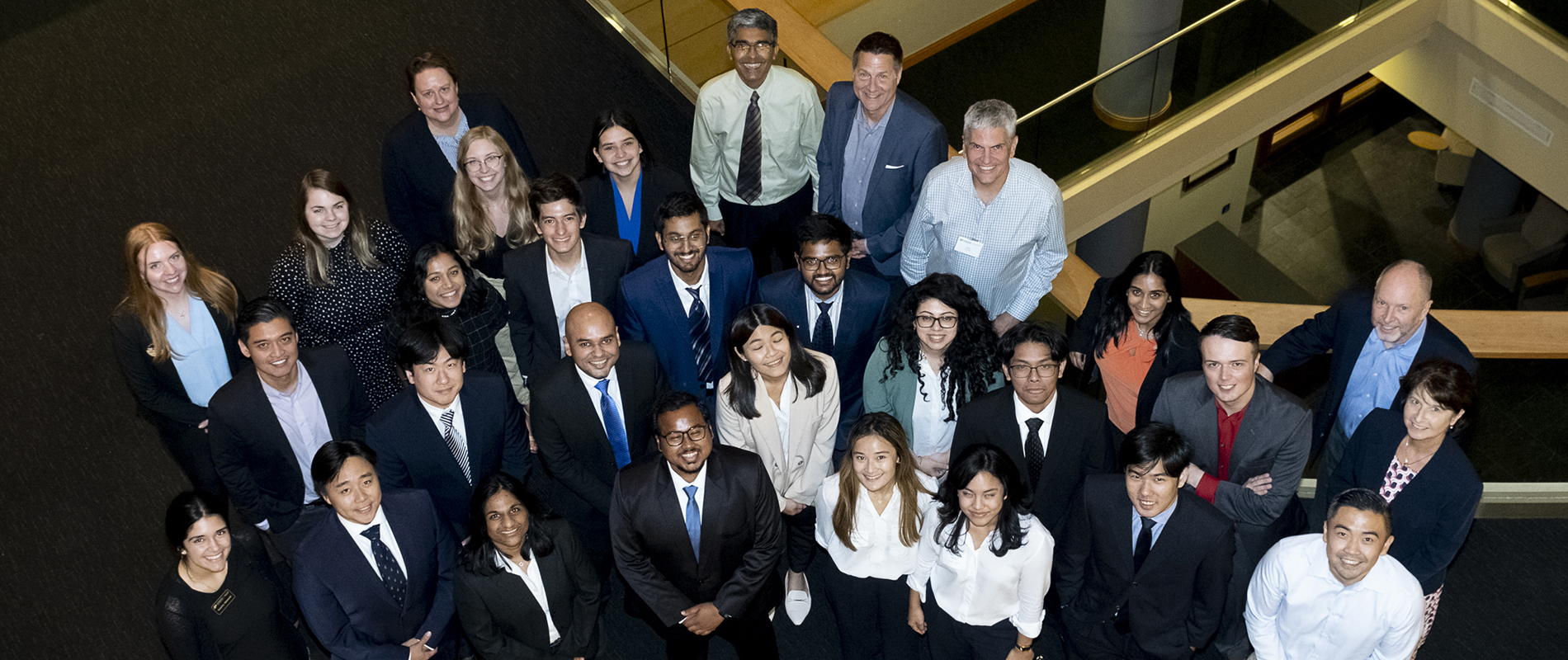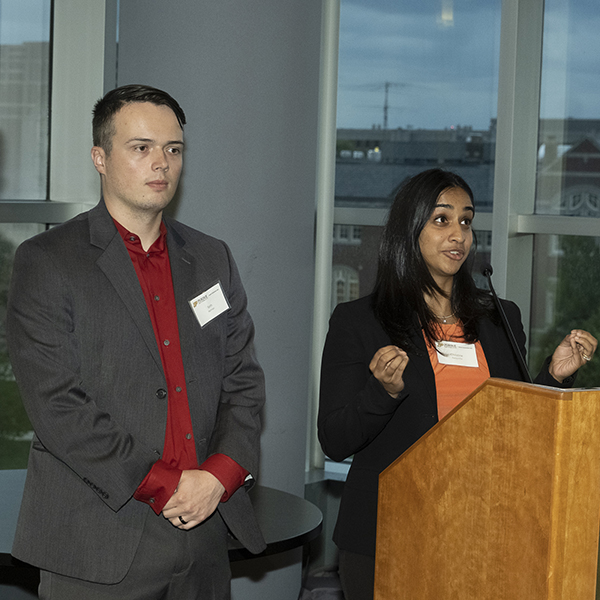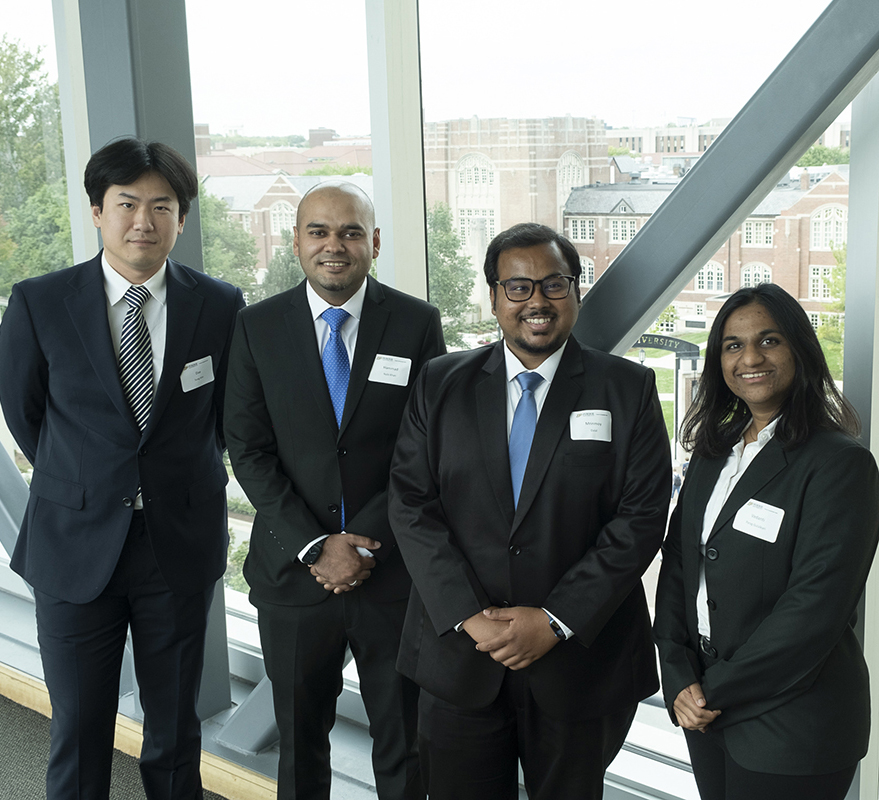
09-26-2022
A 2018 alumna has circled back to the School of Management to again participate in a case competition — this time as CEO of her own startup, presenting a case to current students.
Christine Rasquinha is a graduate of the 3+2 program that allows high-achieving students to earn both their undergraduate and master’s degree in only five years. She recently returned to Purdue for the STAMINA case competition that requires teams of students to solve a business challenge.
 Seth Hartman, Rasquinha’s husband and business partner, joined her in presenting this year’s case, which focused on developing a marketing strategy for Therma-Sleeve, a portable heating device they designed to alleviate joint pain. Rasquinha and Hartman are co-founders of the startup company and serve as CEO and COO, respectively.
Seth Hartman, Rasquinha’s husband and business partner, joined her in presenting this year’s case, which focused on developing a marketing strategy for Therma-Sleeve, a portable heating device they designed to alleviate joint pain. Rasquinha and Hartman are co-founders of the startup company and serve as CEO and COO, respectively.
“When I was a student, I participated in over 30 case competitions, most of them focused on companies that were already established or even fictitious,” says Rasquinha, who also works full-time as program manager for strategic supply at Convoy Inc. “However, I didn’t get a chance to participate in one related to a company that was just starting up. That was one of my reasons for wanting to showcase Therma-Sleeve to students. I wanted them to see what it was like to be at ground zero and have to determine a plan with minimal resources, time, and money.”
Teams had to dedicate a minimum of four hours and no more than eight hours to analyze the case and create a presentation to share their recommendations. This year’s winning team was comprised of four students in the school’s MS in Business Analytics and Information Management (MSBAIM) program — Hammad Nabi Khan, Mrinmoy Dalal, Vedanti Parag Gulalkari, and Dae Sung Kim. Calling themselves the “BAIM and Consulting” team, they bested 40 other teams made up of undergraduate and master’s students from across campus to claim the $2,000 first prize.
 “This was our first time taking part in a case competition and it really provided us with an opportunity to apply our classroom knowledge to a real-world business problem,” says Nabi Khan. “The company is in its infancy stage with a lot of constraints, so we had to think about what realistic measures it could take with its limited resources and how we could maximize the impact of the decisions on their business.”
“This was our first time taking part in a case competition and it really provided us with an opportunity to apply our classroom knowledge to a real-world business problem,” says Nabi Khan. “The company is in its infancy stage with a lot of constraints, so we had to think about what realistic measures it could take with its limited resources and how we could maximize the impact of the decisions on their business.”
The idea for Therma-Sleeve originated from Rasquinha’s own challenges. From her extensive time at a computer for school and work, she developed carpal tunnel and tendonitis. Her physical therapist recommended that she apply heat to her wrist to manage inflammation and reduce the severity of her flare-ups, but the existing products on the market were less than ideal.
In response, Rasquinha and her mother stitched an ordinary heating pad into a sleeve that she could pull up to her elbow and wrist. But it needed to be plugged in to work, which limited her mobility when she was not at her desk. Rasquinha felt that there must be a better solution, so she and her husband got to work developing something new.
The team advanced their product idea through the Purdue Foundry's Firestarter program (now called Ignite), a cohort-based program that helps people explore the commercial viability of their innovations. Using the lessons they learned, Rasquinha and Hartman developed a minimum viable product (MVP) with basic features. Instead of using a corded heating pad, they designed a rice-based cotton sleeve that could be easily heated in the microwave.
For this year’s STAMINA competition, students were tasked with acting as marketing consultants to help refine the go-to-market strategy for the company and validate the market demand for heating and cooling therapy sleeves. Using primary and secondary research strategies, the students conducted a market analysis for Therma-Sleeve that included market validation and SEO, market size and segmentation, and market share, as well as a pricing strategy, distribution plan, and implementation strategy.
The first-place team began by focusing on the company’s customer base. “Without clear understanding of the customer persona, there is no effective strategy,” says Nabi Khan. “This was the first and the most important step we took. We also didn’t want the owners spending their own money, so we had to weigh other options like crowdfunding and keep their best interests at the center of whatever we proposed.”
Rasquinha looks forward to putting the ideas to work. “Judging a case about my own company was surreal because of how much support the students provided and how much they truly cared about helping me and those with similar medical issues,” she says. “The teams that went to finals had solutions that were at the correct level for where Therma-Sleeve is at today and made it easy to picture how the solution could be successful.”
The competition was a collaboration between the Krannert Communication Center and the Krenicki Center for Business Analytics and Machine Learning. The program is sponsored annually by Peter and Magda Clyne, who were joined this year by GM. Peter Clyne selected the case topic and contributed to the case written by Purdue librarian Zoe Mayhook. He was also a judge and supporter when Rasquinha participated and excelled in Krannert case experiences.
Complete List of Winners
1st place — BAIM and Consulting
Hammad Nabi Khan
Mrinmoy Dalal
Vedanti Parag Gulalkari
Dae Sung Kim
2nd place — Synergy
Amrit Singh
Jairaj Paruthy
Nai Wei Lu
Supriya Malla
Finalist — Boiler Solutions
Gabriel Segura
Isha Gupta
Samantha Grace Montgomery
Finalist — Jals & Jils
Gaius Gunawan
Keisha Amanna Johan
Madeleine Silitonga
Zaki Gozali
Outstanding Freshman Team — LL Consulting
Analisia Yasmeen Sanchez
Mackenzie Faith Rodriguez
Mia Claire Dunsmore
Reem Tickoo